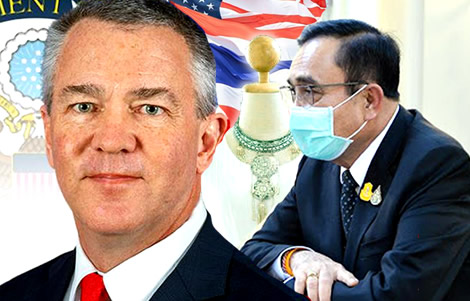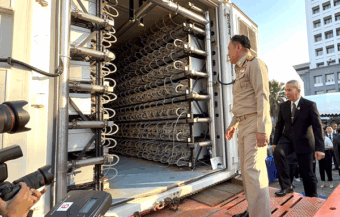Removal of Thailand’s preferred export status in the US and a huge contraction in demand is to blame for the forecasted heavy loss of exports to America in 2020. Thailand is also facing another outbreak of strong US Chinese friction over the coronavirus which will inevitably further destabilise the kingdom’s economy.
Thailand is expected to see a drop of up to 9.2% in exports to the US in 2020, its biggest external market last year. It comes as the kingdom must begin to pick up the pieces again to build up its shaken economy from the coronavirus catastrophe.

The first indication of what will be a paradigm shift for Thailand’s economy in the aftermath of the Covid 19 emergency which closed down huge swathes of the world economy in April, comes this week from the research centre attached to Kasikorn Bank.
It is forecasting that Thailand’s exports to the United States which in 2019 became its biggest export market, will contract by up to 9.2% in 2020.
This may be a foretaste of what is to come for the Thai economy overall and would not be out of line compared to developed countries such as the United Kingdom which openly predicted a 13% economic contraction for this year in recent weeks.
Removal of preferred trading status at the end of April and US economic contraction caused by the virus
The kingdom is facing two hurdles in America.
One is the massive slowdown in the US economy itself which this week reported its biggest contraction in 11 years for the first quarter at 4.8%.
The other is the removal of Thailand from its most favoured position under the US General System of Preferences which was announced suddenly late last year and went ahead at the end of April.
Thailand exports a vast array of products to the United States including electrical hardware, luxury goods and agricultural produce.
60% of Thai exports to the US are in the luxury sector
The partial removal of the GSP preferences impacts a small proportion of Thai exports but it is expected to hurt some Thai companies depending on the US market hard. It also prevents the kingdom from exploiting growth opportunities in these areas.
Kasikorn Bank’s Research Centre this week highlights that 60% of Thai exports are linked with luxury goods both in finished and unfinished modes.
These may also be more susceptible to the expected dramatic downturn in US economic activity.
As well as the recorded contraction for January to March, this virus will have caused a massive setback in April and is still causing severe economic losses even as the US tries to reopen for business.
Thai trade experts looking for US opportunities
Thailand’s exports in specific sectors that have been left vulnerable because of the change in preferences of duty rates include shoes, motorcycles, wicker bags, ceramics and artificial flowers.
The country’s trade promotion unit at the Ministry of Commerce has been working to try to bolster Thailand’s export drive in America in particular with efforts to try to exploit changes in work and lifestyle patterns ushered in by the virus.
One of these is the move towards people working from home.
Growing tensions and friction between the US and China, linked with the Covid 19 disaster
In the medium term, however, Thailand can also expect the coronavirus will dampen demand in all export markets particularly in Europe and China.
The kingdom will have to again deal with heightened tensions and friction which are likely as the US President Donald Trump signalled this week tough action against Thailand’s second-biggest export market and dominant northern neighbour.
The coronavirus emergency has also seen heightened tensions in Asia between China and other powers particularly in relation to the vexatious South China Sea dispute.
Damage to Thailand’s economy caused by the negative dynamic prompted by US-China friction
The friction between the US, China and other neighbours will, as it has already done before, spill over into a negative dynamic for the Thai economy.
This is what we have seen since the outbreak of the US-China trade war in 2018 as it slowly but surely unpeeled global supply chains.
As the world is threatened with a Great Depression and still tries to navigate its way out of the coronavirus catastrophe, Thailand will have to tread carefully as it starts to pick up the pieces.
Exports and tourism are still the key priorities
We have yet to see the level of the economic contraction experienced by the Thai economy in April but it will surely be a staggering number as it will be for many economies all over the world faced with the need to counter the health threat.
The Thai economy is export-led accounting for 70% of GDP. This means that any recovery in the kingdom’s prospects must be through export growth and the development of tourism.
More ‘proactive’ trade relationship with the United States discussed with US envoy in early April
At the beginning of April, Thai Prime Minister Prayuth Chan ocha met the new US Ambassador Michael DeSombre at Government House and both parties talked about developing and building a more ‘proactive’ trade relationship.
A stronger bilateral trade agreement with the United States has many economic and political implications for Thailand from labour relations to competition policy as well as its relationships with China.
Further reading:
Thailand and US aim for a new more ‘proactive’ trading relationship as ambassador meets Prayuth
Government begins looking at borrowing options to fund huge ฿1.9 trillion economy rescue package
Thailand and US aim for a new more ‘proactive’ trading relationship as ambassador meets Prayuth


















